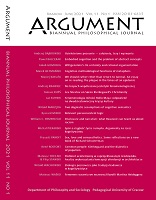Spór o ciągłość życia i umysłu
The dispute over the continuity of life and mind
Arguments for cognitivism
Author(s): Michał PiekarskiSubject(s): Special Branches of Philosophy, Philosophy of Mind, Philosophy of Science, Cognitive Psychology
Published by: Wydawnictwo Uniwersytetu Komisji Edukacji Narodowej w Krakowie
Keywords: life; mind; semantic information; syntactic information; free energy principle; normativity; body; content; Markov blankets;
Summary/Abstract: The dispute over the continuity of life and mind. Arguments for cognitivism: The purpose of this paper is to discuss the position of non-cognitivism on the issue of the so-called dispute over the continuity / discontinuity of life and mind. In discussing the views of Michael Kirchhoff and Tom Froese, I will point out some difficulties related to their position. Next, I will formulate three arguments in favor of the cognitive alternative, emphasizing the need to resort to semantic information in explaining these phenomena. According to noncognitivist position, there is a continuity in the life-mind line, which can be justified by referring to the concept of Shannon’s syntactic information. Opponents of this thesis, i.e. supporters of cognitivism, claim that the explanation of cognition requires the use of other tools than those used to explanation of life, because, first, the notion of syntactic information does not exhaust the complexity of these phenomena, and, second, the non-cognitive position raises many problems and ambiguities. According to cognitivists, when explaining life and mind, one should refer to the concept of semantic information that is rejected by noncognitivists. In the Conclusion I will analyze the ambiguities and assumptions related to the thesis about the continuity or discontinuity between life and cognitive processes.
Journal: ARGUMENT: Biannual Philosophical Journal
- Issue Year: XI/2021
- Issue No: 1
- Page Range: 71-91
- Page Count: 21
- Language: Polish

